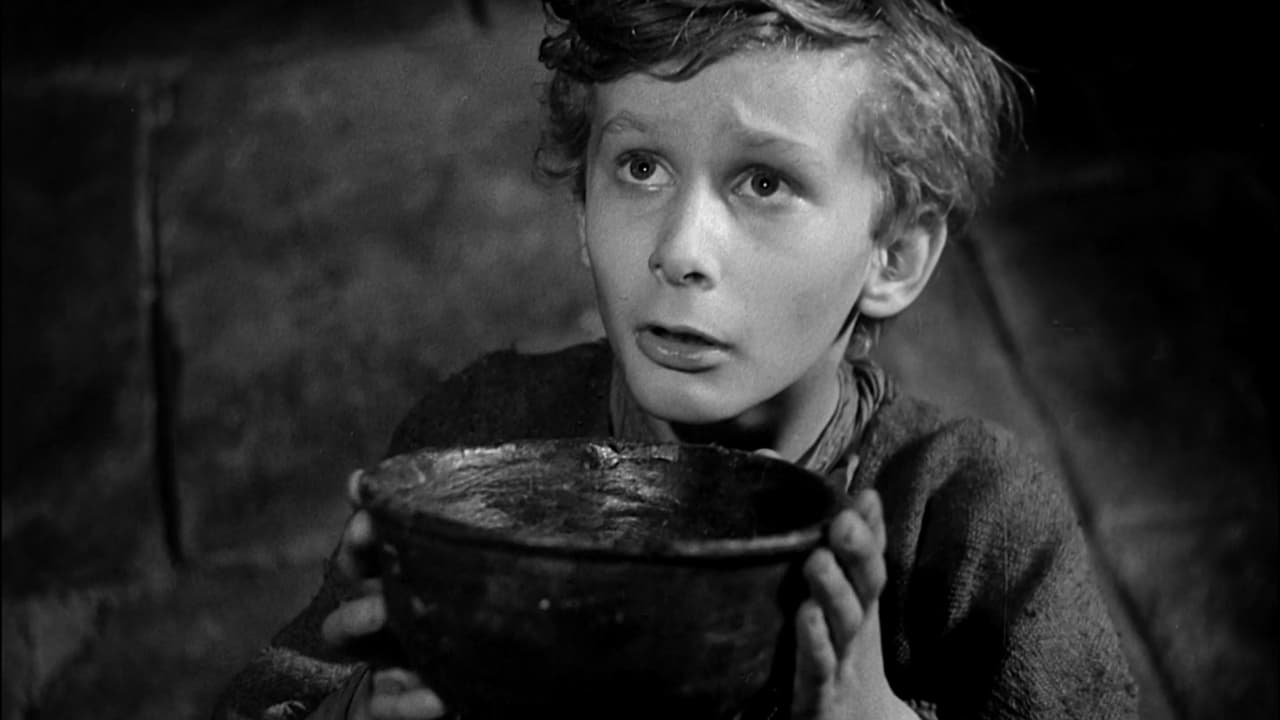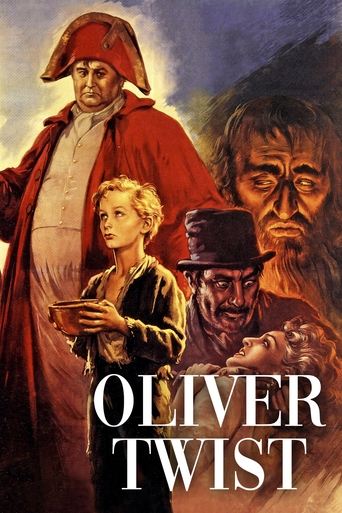

"Oliver Twist" the novel rests at top of mind for the general public when it comes to Charles Dickens. Dickens wrote better novels, so why is "Oliver" so magisterial in his canon? Maybe I'm at fault for not liking the book more, but I suspect the answer has much to do with David Lean.Lean's adaptation of "Oliver Twist" is a textbook example of how a director can boil away the dross and bring out the core of a great story, adhering to the spirit of the author's intent but rediscovering it as a product of its place and time in a way that makes it timeless. The Expressionistic camera-work, its deep-focus lens pulling out details from a seemingly slapdash set, married to an unobtrusive yet penetrating score and a variety of brilliant character actors lending face and voice to a true group effort. It's like "Citizen Kane" meets Hogarth.When we first meet Oliver, he is inside his dying mother as she makes her painful way to a solitary light on a hill, a light that proves more ominous as she gets closer. Her painful journey is later made light of by one of Oliver's first enemies, a beadle named Bumble who sees her strength and bravery as exposing an animal nature that allows for his mistreatment of her son. "God Is Love" says the message on the brick wall of Oliver's workhouse, but there is no love for the boy in the first third of the film, a harrowing journey for any sensitive viewer to make.Francis L. Sullivan plays Bumble, an actor who gives the best performance in Lean's earlier Dickens movie, "Great Expectations." He's quite fine here playing quite a different role, both menacing and funny, but other actors make even deeper impressions.Alec Guinness gives his breakout performance here as Fagin, the crafty thief and seducer of virtue. Yes, Fagin as written by Dickens is also known as "the Jew," and with his big prosthetic nose Guinness plays with that stereotype more than a bit, but he also gets at the core of Dickens' villain by using that to accentuate his role as the consummate outsider, finding diabolical angles in a world where he is not welcome. Guinness was such a cerebral actor that it's hard to adjust to the feral nature of his performance here, except it makes the part and thus the movie.Fagin is a frightening villain, as is first-billed Robert Newton as the crazed Sikes, because we get the fear at the core of their villainy. Dickens wrote "Oliver Twist" not as adventure story but social exposé of his native London, a cruel city of dire poverty and no second chances. Seeing young Oliver (John Howard Davies) at its mercies is no easy thing, and we realize how Fagin and Sikes are products of that society. Watching them face a mob bent on their comeuppance is both thrilling and horrifying, because we know by then how cruel their world is.When the undertaker Sowerberry (Gibb McLaughlin) complains to Bumble early on about the small price given for his services to the workhouse, Bumble just smiles: "So are the coffins!" How he can smile at such a thing is harder to reckon than any of Fagin or Sikes' awful crimes.Being plunged into such a world, one wants for the relief Oliver first finds, than loses, with kindly Mr. Brownlow (Henry Stephenson). Much streamlining is called for here, and aptly done by Lean and co- screenwriter Stanley Haynes. Ditching a maudlin subplot involving a young woman Oliver befriends named Rose Maylie is a stroke of genius given how little she is missed. More problematic is the matter of Oliver's mysterious stalker, Mr. Monks, who does show up here but in a way that raises more questions than answers.Could Oliver have been better incorporated into the film's second half? Howard Davies does great with what he's given, and I for one wanted more. But I think what you do get is pretty classic in its own right, a finale that ranks up there with the best filmdom has ever offered.You will want to read the book after seeing the movie, if you haven't already. And you will likely admire it, as I do, for its humanity and bracing power. Still, for getting across both Dickens' story and its underlying social commentary, no one, not even Dickens himself, did as good a job as Lean and company do here.
... View MoreReally enjoyed the 1948 film of "Oliver Twist", and to my mind the definitive version of the story. I saw the 1968 musical which was good, but was inflated to 150 minutes with musical numbers and almost came to a stop in some parts. It won an Oscar for Best Picture, but the '48 film was better in several respects.First off, the acting was superior in the Lean picture. Clive Revill was a pale imitation Alec Guinness as Fagin, and Francis L. Sullivan, while not a singer, was a much better actor than Harry Secombe. And, last but not least, Robert Newton's interpretation of Bill Sykes was far superior to Oliver Reed's. Reed's Sykes was a bully while Newton imbued the character with a psychopathic element missing from Reed's. It was also remarkable to note the resemblance between John Howard Davies and Mark Lester, the two child actors who seemed like twins.The earlier version also conveyed the overarching feeling of hopelessness and the grinding poverty of the lower classes, as much a tribute to the art director as to the intelligent script, written by Lean himself. Musical director on that version was Muir Mathieson, and it doesn't get better than Mathieson. "Oliver Twist" is one of the best adaptations of literature to the screen as has ever been done.
... View MoreAside from the wonderful musical "Oliver!", this is probably the best version of "Oliver Twist" you can find. "Oliver!" is a bit light-hearted--while this 1948 version is clearly more vivid in its portrayal of evil. Both are very well worth your time.As for the story, I won't bother recounting it--it's such a familiar story. Instead, I want to briefly focus on how it's different from some other versions. Although Oliver Twist is clearly the star of the film, this version de-emphasizes the boy--and focuses a lot more energy on the evil surrounding him--such as the Beadle and, more importantly, on the horrid Bill Sykes. You won't find a more vivid portrayal of Sykes (Robert Newton)--and at times it's a bit hard to watch the guy--it's very rough stuff for the time and even today. For instance, while the camera doesn't show all of his brutal beating he inflicts, it is loud and vicious--and the way the camera focuses on the panic-stricken dog is brilliant and VERY disturbing. It's also amazing to see Newton's face as he sits there looking at the corpse hours later--as if HE is horrified by his actions! You also see death in the eyes of the animal and in its body language--and is one of the most amazing scenes I can recall from the era. I wonder how they elicited that reaction...I sure hope they didn't do anything horrid to the dog to make it do that.Another portrait in evil that is quite good is Alec Guinness as Fagin. While you might not recognize him under all that makeup, it's him in one of his earliest films. An interesting note is that Israel banned the film for its antisemitic portrait, though at least unlike the original editions of "Oliver Twist" at least Fagin isn't constantly referred to as 'the Jew'! I really don't think the portrayal is, in itself, antisemitic BUT it does feed into a common stereotype of the era--of the wicked and money-hungry Jew. In fact, Dickens himself apparently came to regret how he described Fagin and de-emphasized this in later editions (removing most of the Jewish references). I would say that Guinness' character was less Jewish and more a subhuman troll! He is cruel and vicious--and little like the funny Fagin in "Oliver!".Apart from the VERY vivid portraits of evil, the biggest star of the film is the great cinematography. There are wonderful shots--with unusual angles and lighting. And, because of this, the film appears very similar to some American film noir pictures. Lovingly shot, that's for sure. Overall, a terrific picture--one of the best of the era. And, well worth seeing.
... View MoreI can't believe that only one person in the review section, and no one in the message board section has commented on the magic of the film score for OT. Arnold Bax, the composer, was one of England's greatest composers, and this was the only film he scored, even though he was asked to do others. Perhaps the fact that people didn't even notice the music, yet enjoyed the tone and mood of the film is a reflection on how well the score worked. In any event, I saw this film when I was a kid back in the 60s, and it's amazing how so much of it has stayed with me after all these years. I never even realized that it was AG who played Fagin till I saw the credits! The last scenes of the entire city rampaging through London to hunt down Bill Sykes was wild! I think it may have caused me to imagine that something like that should happen to a certain corrupt leader of NYC...The scene with the dog was much more powerful than showing the actual violence that was going on. Excellent film making.
... View More